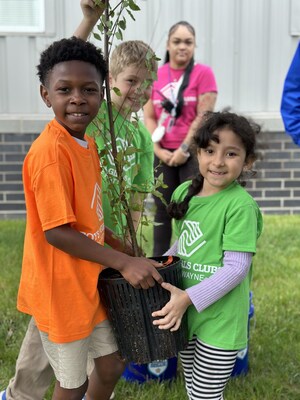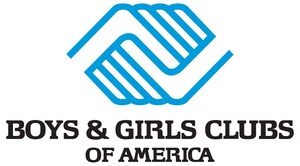WASHINGTON, Sept. 25, 2019 /PRNewswire/ -- Boys & Girls Clubs of America joined Sen. Tina Smith (D-MN) and Reps. Josh Harder (D-CA) and Brian Fitzpatrick (R-PA) to announce the plan to introduce the Youth Workforce Readiness Act of 2019, an important initiative focused on investing in kids and teens' knowledge and skills to help ensure youth are adequately prepared to enter the workforce. This comes as the Boys & Girls Clubs of America also launches their "Agenda for America's Youth", an inaugural public advocacy platform concentrating on the critical issues and solutions impacting America's youth. Workforce readiness is one of the primary objectives for the Agenda for America's Youth, ensuring young people today have access to experiences and opportunities which prepare them to be tomorrow's leaders.
"To solve the challenges we face as a nation to effectively prepare and equip a skilled workforce, we must start by investing in young people early. Recognizing the time kids spend after school and during the summer as critical for ensuring prosperity and equity for all young people, is just the first step in bringing solutions for our youth," said Jim Clark, president and CEO at the Boys & Girls Clubs of America. "Partnering with leaders like Sen. Smith and Reps. Harder and Fitzpatrick will help us bring national attention and action, so together we can commit to closing the opportunity gap that exists for so many kids and teens today."
Communities across America face significant challenges working to ensure youth are adequately prepared to enter the workforce and have the essential skills needed to be successful. The Youth Workforce Readiness Act establishes a competitive grant for eligible national out-of-school-time programs, focusing on the four pillars of youth workforce readiness – essential skills development; career exposure; job-readiness; and work-based learning. Supporting America's youth has never been more urgent in the nation's history.
"When I listen to young people, I hear that they are interested in contributing to their communities and obtaining good jobs in the future," said Sen. Tina Smith. "And what I hear from employers is that they need help getting connected to great employees with the skills to succeed. After-school and out-of-school time providers are ideally positioned to help empower young people with the skills they need and make connections to local employers, all of which will help support youth success for years to come and further develop our workforce."
"I've heard loud and clear from Central Valley families that we need more good paying jobs here at home and one of the best ways we do that is by expanding educational opportunities for our young folks," said Rep. Harder. "By introducing students to hands-on skills training as early as elementary school, we can help guarantee that they graduate high school ready to succeed in the workforce."
"Setting our country's kids up for success requires investment in career development and education at a young age," said Rep. Brian Fitzpatrick. "I am proud to work with Congressman Harder and partner with the Boys & Girls Club of America, a truly remarkable organization, to find bipartisan solutions like the Youth Workforce Readiness Act that give American kids the tools to accomplish great things."
This initiative demonstrates the Agenda for America's Youth in action as well as the importance of public-private partnerships. Recognizing the current and future needs of the country's young people, for more than two years Boys & Girls Clubs of America sought the input of Club leaders, board members, partners, youth and alumni infused with data from the National Outcomes Report to create the Agenda for America's Youth. The Agenda is organized into five advocacy areas that reflect the needs of young people and what policymakers must prioritize as they consider and implement legislation and ordinances that will have an impact on kids and teens.
Out-of-school-time is at the forefront of the Agenda because it is the critical vehicle for accomplishing these solutions for kids and teens, including ensuring safer childhoods, so every child feels safe physically and emotionally, not just in Clubs but everywhere. Clubs not only make childhoods safer, they're building the resiliency that will last a lifetime. Clubs will champion issues that support youth in good decision making and in embracing healthy lifestyles & wellness. Youth must be prepared for life after the Club, policies must include a focus and investment in education, leadership skills and workforce readiness, equipping youth with the skills they need to succeed in the workforce as well as access to partnerships for real-life experiences to explore career options. And finally, equity and inclusion must serve as the foundation for every policy aimed at impacting youth.
"We can so clearly see our future, and state of our Nation, by how we set up our kids and teens to be successful," said David Seaton, board chair of Boys & Girls Clubs of America. "We must ensure that out-of-school time is prioritized in our country. During this critical time, we have a significant opportunity to ensure young people have a safe place to go, with positive mentors and life enhancing programs that ensure they learn the skills needed to succeed after high school."
Clubs are trusted voices in communities across the country—located in nearly every Congressional district, with more than 4,600 sites serving more than 4.7 million youth annually, Clubs are located in cities, towns, public housing and on Native lands throughout the country, and serve military families in Boys & Girls Clubs of America-affiliated Youth Centers on U.S. military installations worldwide.
About Boys & Girls Clubs of America
For more than 150 years, Boys & Girls Clubs of America (bgca.org) has enabled young people most in need to achieve great futures as productive, caring, responsible citizens. Today, nearly 4,600 Clubs serve 4.7 million young people annually through Club membership and community outreach. Clubs are located in cities, towns, public housing and on Native lands throughout the country, and serve military families in BGCA-affiliated Youth Centers on U.S. military installations worldwide. They provide a safe place, caring adult mentors, fun, friendship, and high-impact youth development programs on a daily basis during critical non-school hours. Priority programs emphasize academic success, good character and citizenship, and healthy lifestyles. In a Harris Survey of alumni, 54 percent said the Club saved their lives. National headquarters are located in Atlanta. Learn more at www.bgca.org or on Facebook and Twitter.
SOURCE Boys & Girls Clubs of America

Related Links
WANT YOUR COMPANY'S NEWS FEATURED ON PRNEWSWIRE.COM?
Newsrooms &
Influencers
Digital Media
Outlets
Journalists
Opted In






Share this article